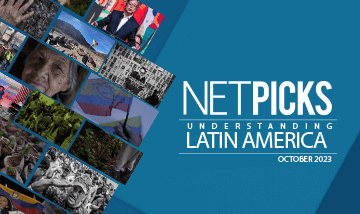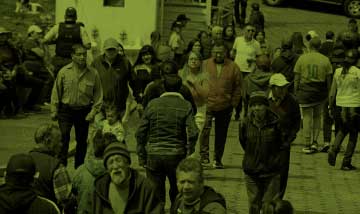Índice
- COVID-19 AND THE HEALTH CRISIS IN LATIN AMERICAN
- JUGGLING CRISIS: LATIN AMERICA’S BATTLE WITH COVID -19 HAMPERED BY INVETMENT ARBITRATION CASES
- U.S. EXPANDS INFLUENCE IN THE BRAZILIAN AMAZON DURING PANDEMIC
- CANADA: THE OTHER IMPERIAL POWER IN LATIN AMERICA
- FAMILIES IN GUAYAQUIL SEEK ANSWERS AFTER COVID-19 DEATHS
Understanding Latin America
This month we bring you five articles: on COVID-19 and the origins of the Health Crisis in Latin America; on the problems caused during the crisis by Investment Protection Agreements; from Brazil on the expanded presence during the crisis of US companies related to destruction of the Amazon; from Central America where Canadian mining companies are being accused of human rights abuses; and from the city of Guayaquil in Ecuador, where families are still hoping to locate the remains of COVID-19 victims whose bodies have gone missing.
COVID-19 AND THE HEALTH CRISIS IN LATIN AMERICAN
According to the UN Policy Brief “The Impact of COVID-19 on Latin America and the Caribbean”, COVID-19 will result in the worst recession in the region for a century, causing a 9.1% contraction in regional GDP in 2020. This could increase the number of poor by 45 million (to a total of 230 million) and the number of extremely poor by 28 million (to 96 million), placing them at risk of malnutrition. The poverty rate is expected to jump by 7.0 percentage points in 2020, to 37.2%, while extreme poverty is expected to rise by 4.5 percentage points, from 11.0% to 15.5%. The problems, says the author, began with the neoliberalization of the continent’s economies in the 1980s and 1990s, which also led to a dual system of health care: a market-driven system for the insured, and a public system for the uninsured. However, Latin American governments presently spend, on average, less than 6% of GDP on health, while households in the region cover more than one-third of their health care costs through direct out-of-pocket payments (34%). Latin America and the Caribbean is also highly dependent on imports of medical products, and to date more than 70 countries —including four of the region’s top five suppliers, of which the first is the United States— have restricted their medical exports in response to COVID-19. In all, the prospects for socialized medicine, which until recently seemed dismal, now appears to be assuming greater impetus.
Yanis Iqbal, August 9th, 2020
https://zcomm.org/znetarticle/covid-19-and-the-health-crisis-in-latin-america/
.
JUGGLING CRISIS: LATIN AMERICA’S BATTLE WITH COVID -19 HAMPERED BY INVETMENT ARBITRATION CASES
Latin America and Caribbean countries are suffering the consequences of having signed more than 470 trade and investment protection agreements; foreign investors have already brought nearly 300 known claims before international arbitration tribunals against the region’s states. Now, in midst of the COVID-19 health crisis, rather than allowing countries breathing space to deal with unprecedented demands for health care, investors, spurred on by legal advisors, are intending to sue states for income lost as a result of measures introduced to deal with the crisis. International arbitrators dealing with these claims are refusing to accept requests to postpone ongoing cases and are forcing governments to pay out millions to investors at a time when public funds are required for more urgent priorities. In total, Latin American States have been ordered or have agreed to pay a total of US$ 31 billion, more than three times the amount of loans the World Bank, the Inter-American Development Bank and the Development Bank of Latin America have made available to the region to tackle the COVID-19 crisis. Meanwhile, the amount demanded by investors in pending claims (where the amount is known) is US$ 40 billion. Nor have claims stopped during the crisis, between March and July of this year, nine new claims were presented, and although these are unrelated to COVID-19 measures, they divert funds from the fight against pandemic. It is going to be difficult for governments to avoid the wave of claims the crisis will unleash, say the authors, but they can prevent a future repetition by not signing more Investment Protection Agreements when there is no evidence they bring any benefits.
Cecilia Olivet & Bettina Müller, August 25th, 2020
https://longreads.tni.org/jugglingcrises
.
U.S. EXPANDS INFLUENCE IN THE BRAZILIAN AMAZON DURING PANDEMIC
Cases of COVID-19 in the Brazilian Amazon are increasing. By August 6, the Special Ministry of Indigenous Health, SESAI, issued a confirmed case count among Indigenous people of 17,198, claiming 305 deaths. However, the death count may be under-reported. The Articulation of Indigenous People of Brazil (APIB), an independent body, reports 22,656 confirmed cases and 639 deaths of indigenous people. But the US government is interested in helping out; on June 2nd, U.S. Ambassador to Brazil, Todd Chapman, stated “Combating Covid-19 in Brazil is our top priority right now. Working across the U.S. government and engaging closely with American companies in Brazil…” The Trump administration has donated US$12 million since May, (US$2 million for the Amazon), as well as two million doses of hydroxychloroquine. But not everyone is convinced. Brazilian agronomist Sebastião Pinheiro says that “It’s a business deal by Trump, to benefit the Bayer-Sanofi companies that produce this medication. There is no scientific foundation backing its use against Covid-19…… It’s only Bolsonaro’s administration that promotes it.” At the same time, the American Chamber of Commerce for Brazil (Amcham), the U.S. Embassy, and the Mais Unidos group have been boosting their image in the country, donating a total of $53 million (many donations in the form of American companies’ own products) to fight Covid-19. However, the companies involved include agro-industrial giants Bunge, Cargill, ADM, Dupont, McDonald’s, CocaCola, Pepsico, and BurgerKing, companies that have the author points out, directly and indirectly incentivized Amazon deforestation. Amazon Watch has documented these trends in their report ‘Complicity in Destruction’ II.
Destruction’ II.
Santiago Navarro F., August 12th, 2020
https://nacla.org/news/2020/08/07/us-influence-brazilian-amazon
.
CANADA: THE OTHER IMPERIAL POWER IN LATIN AMERICA
When International Nickel (INCO) moved to Canada from the US at the beginning of the 20th century, it was because Canada offered, as a Forbes article put it: “a sanctuary from high taxes and antitrust” it would have to deal with in the United States. The practice continues, and Canada today is one of the world’s safe havens for mining companies. The difference is that Canadian companies have now extend their reach into Central and South America, accompanied by a litany of accusations of environmental and human rights abuses. In the first half of the 1990s the number of Canadian mining projects in Latin America increased dramatically, and as of January 2018, Canadian companies were operating 1,113 projects in Latin America. One of these is the Fenix mine in Guatemala, which is also an example of the accusations against Canadian owned and operated mines. According to witnesses, Adolfo Ich Chamán, leader of the Maya Q’eqchi community in eastern Guatemala, and an outspoken opponent of the mine, was killed by security agents working for the mine. His death was part of a wider campaign of intimidation: including the shooting of another community member, which left him paralyzed, and the 2007 forced eviction and gang rape of 11 women in a neighboring village. But Chub Choc’s wife Angelica Choc is now a plaintiff in a civil lawsuit against Canadian mining company HudBay Resources. This precedent setting case could help turn things around, and see at least minimal accountability for Canadian companies that have for so long operated with impunity.
Heather Gies, February 20th, 2020
https://elfaro.net/en/202002/internacionales/24017/Canada-The-Other-Imperial-Power-in-Latin-America.htm
.
FAMILIES IN GUAYAQUIL SEEK ANSWERS AFTER COVID-19 DEATHS
Between March and April of this year the province of Guayas –where Guayaquil, Ecuador’s second city is located– suffered 13,000 excess deaths. The number was so great that the system for managing bodies collapsed, and as no protocol for managing the accumulation of bodies was in place until April 11th, many were simply stored in containers. Given Guayaquil’s humid climate and the lack of refrigeration in the containers, the bodies gradually decomposed and name tags were distorted. Months later, dozens of families (more than 138 people initially complained) are still waiting to hear from authorities about what happened to their relatives, while trying to remain positive that the bodies will eventually be identified. On June the 26th, a judge ruled in favor of the Defensoría del Pueblo (Office of the Human Rights Ombudsperson) representing families who had filed complaints regarding missing remains. Beyond requiring the identification of the bodies, the ruling also demanded that the Institute of Social Security Institute and the Ministry of Health make a public apology; on July 31st a small statement appeared in a local newspaper, signed by an official from the Ministry of Health’s Guasmo Public Hospital. The ruling also called on the Ministry to provide psychological treatment to the victims of the families for one year, and that these entities seek proper training for the next public health emergency.
Vincent Ricci, August 4th, 2020
https://nacla.org/guayaquil-coronavirus-missing-remains





